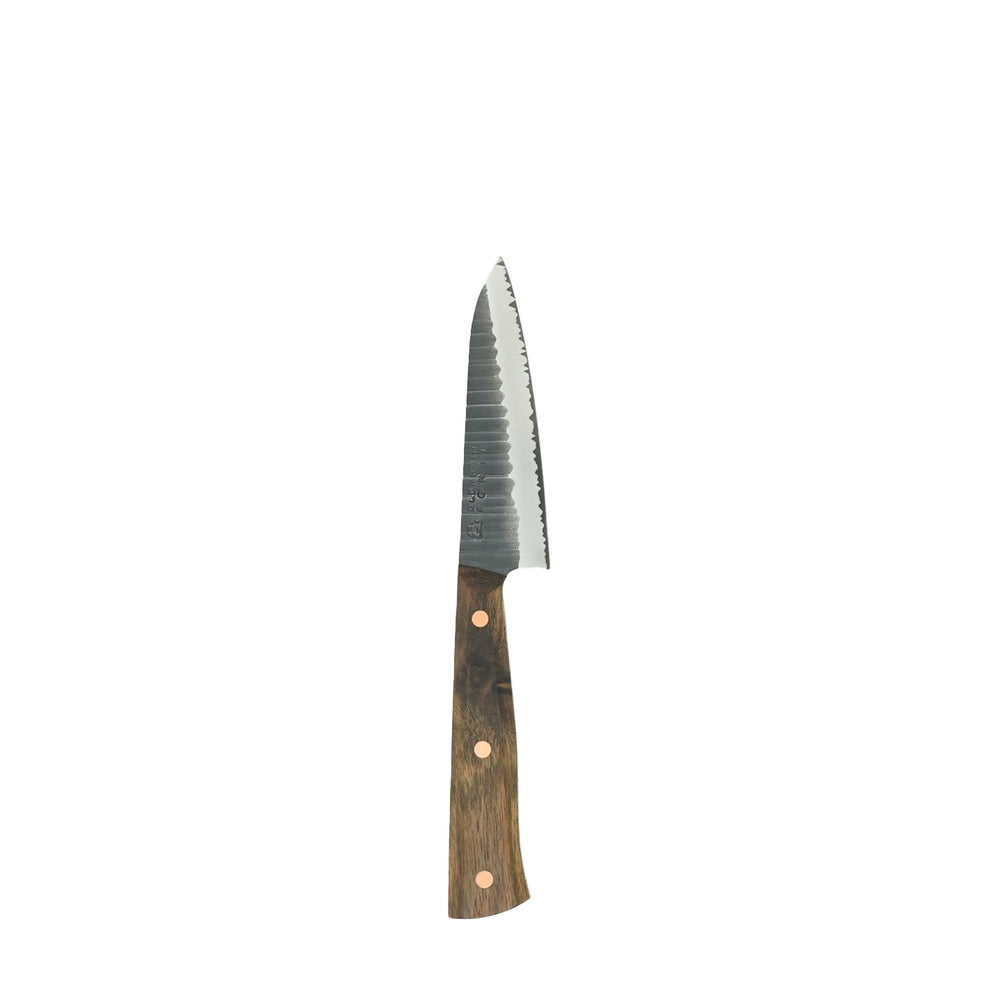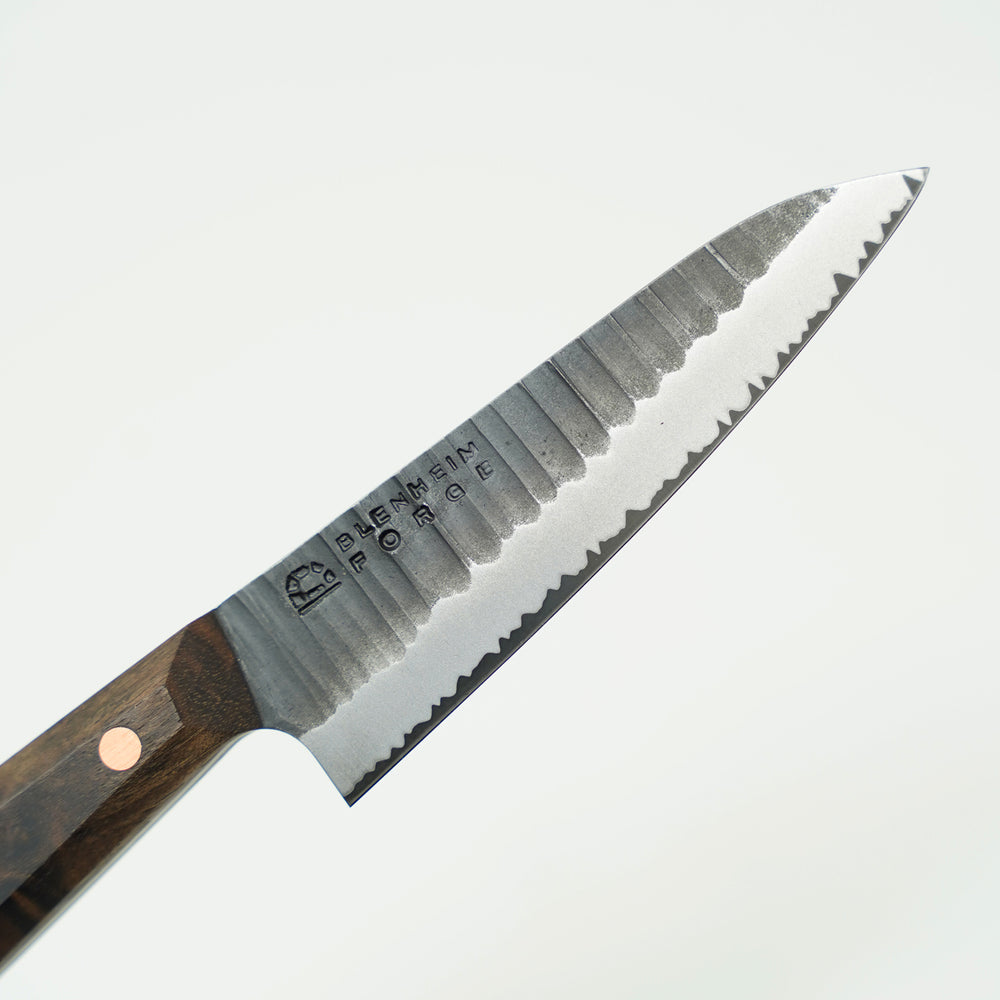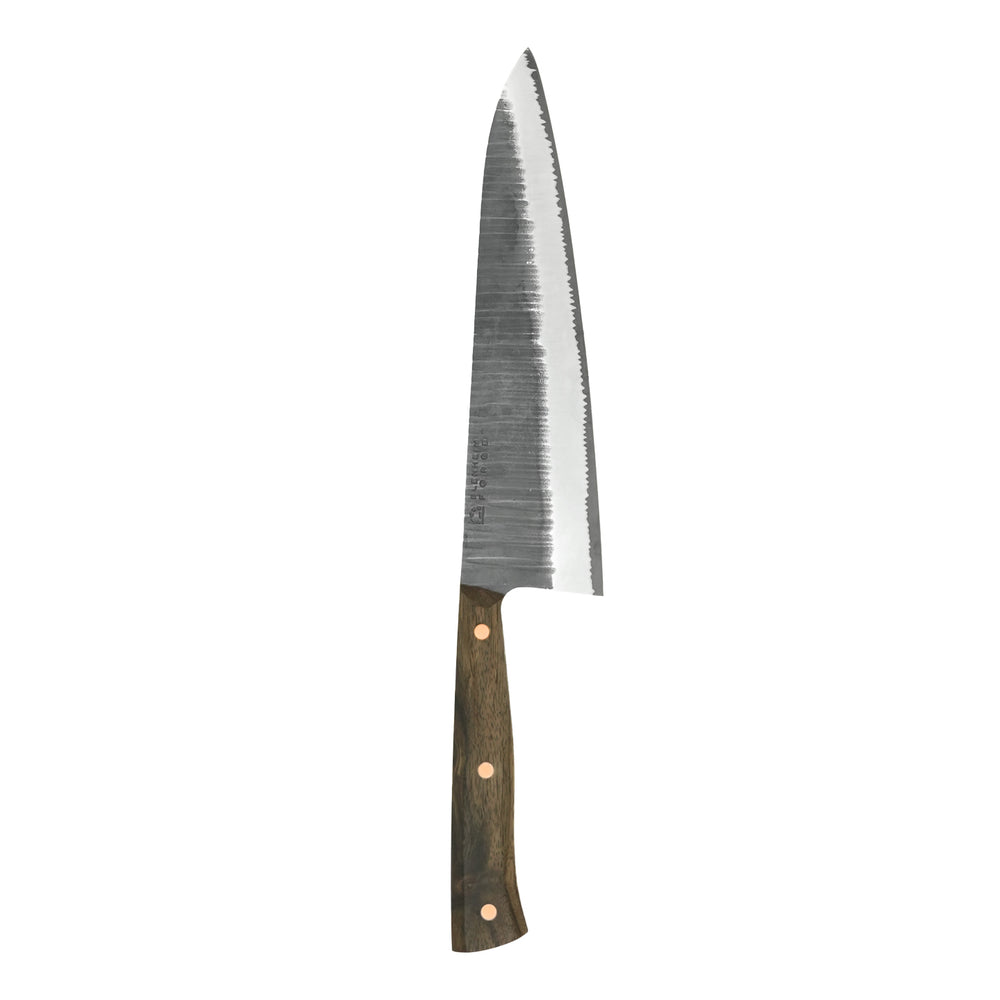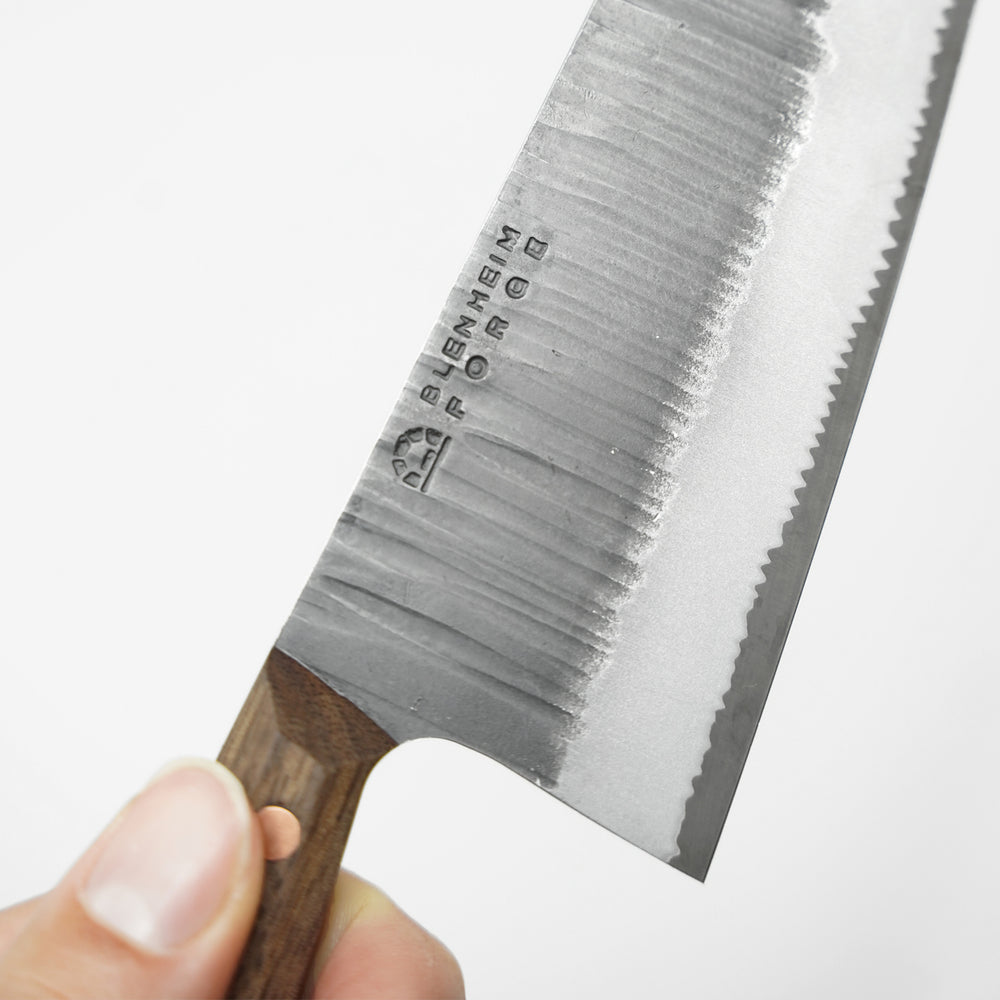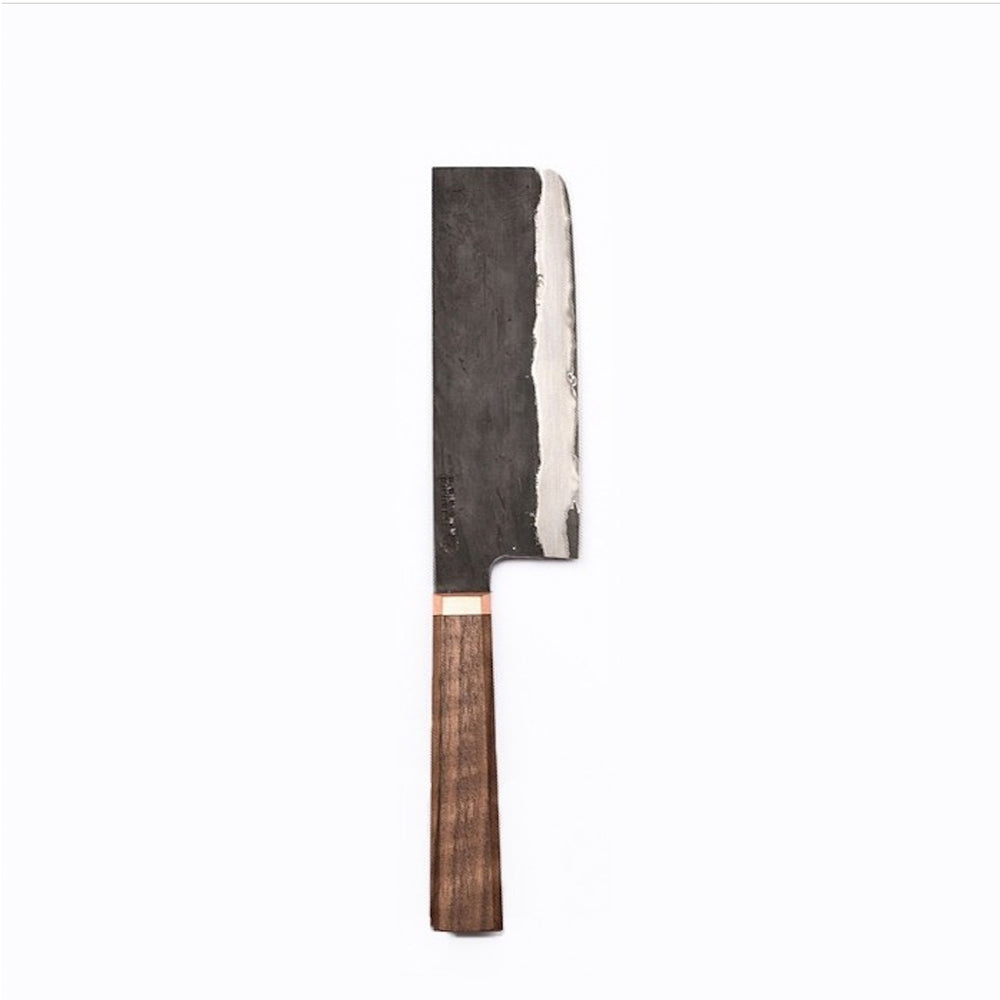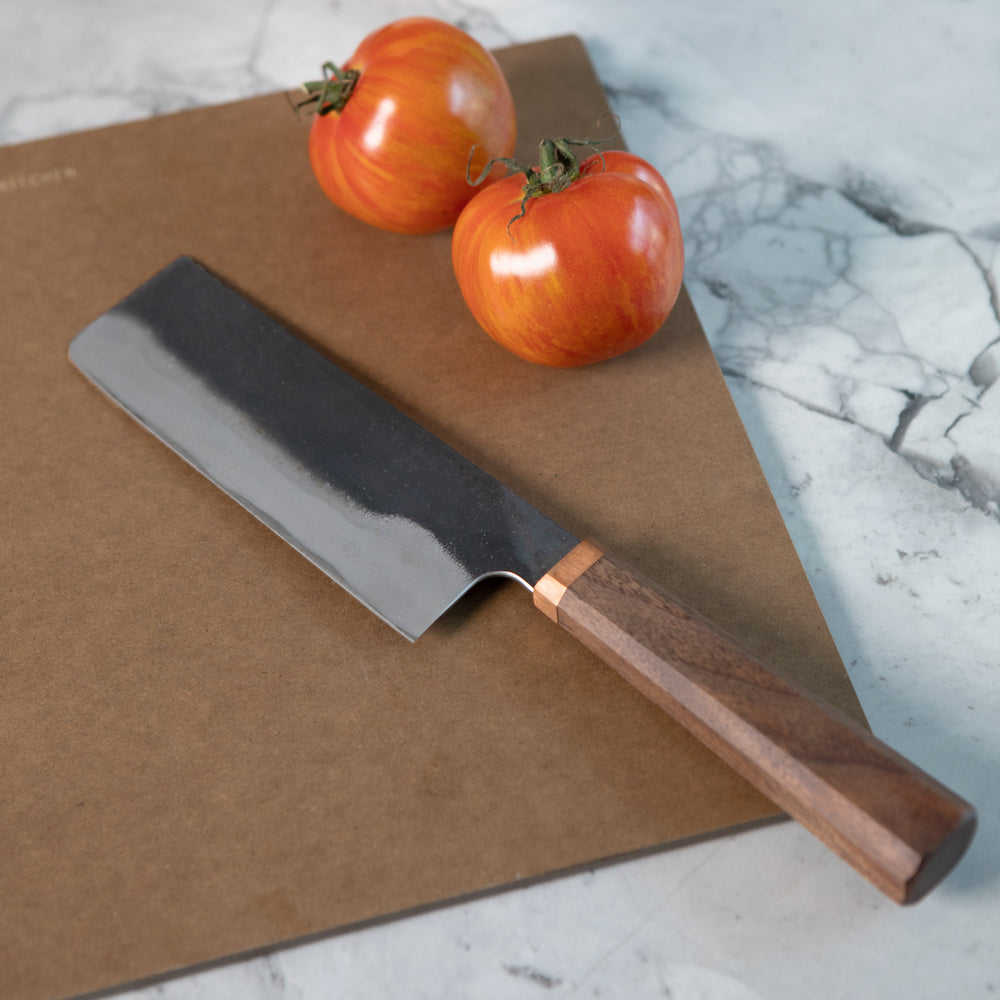Lovingly crafted by hand, these Blenheim Forge knives feature cores made from Japanese Super Blue Paper Carbon Steel, also known as Aogami Super Steel. Carbon steel knives are a marvel to sharpen and hold a silky edge that will glide through ingredients. Japanese Super Blue Paper Steel is considered to be the best mix found to produce knives. In addition to containing more carbon, chromium and tungsten than other steels, Japanese Super Blue Paper Carbon Steel also includes molybdenum, which is highly resistant to corrosion. This combination of components lends the steel increased strength and hardness that leads to wonderful edge retention.
Blenheim Forge gets their walnut wood for the handles from Goldfinch, a charity enterprise run by London Reclaimed. The charity helps 16-25-year-olds into the workplace through training in joinery and furniture making. Almost all wood for these knives is sourced within the M25, much of which comes from fallen trees.
What further sets Blenheim Forge apart from other knife manufacturers is their process of cladding their carbon steel blades with stainless steel - around 85%. This leaves the carbon steel exposed only at the edge of the blade, meaning upkeep is minimal when compared to other carbon steel knives. Simply wipe the blade down with a little bit of oil before storage.
Frequently Asked Questions
What is carbon steel?
Put simply, carbon steel is steel in which the main alloy is carbon. Stainless steel has added chromium, which makes the steel impervious to corrosion and rust. Unfortunately, this comes at a cost to the strength of the steel, the edge retention and the sharpness of the edge. Carbon Steel knives, when properly maintained, are sharper and easier to sharpen than stainless steel.
How do you maintain a carbon steel knife?
It’s very important with carbon steel to treat the blade with the respect it deserves. Don’t allow it to sit with food particles on the surface and never leave it damp. Carbon steel can stain and is prone to rust if left damp. After use, wash it up immediately, and never leave it to soak in water. Dry thoroughly before giving it a wipe down with some oil to protect the surface. The blade can be treated with oil every time it is washed, or more infrequently – just keep an eye on the condition of the blade and watch for rust. Carbon steel will gain a patina with use. Like good leather boots, your knife will adapt to your use of it and become more and more your own. In return for your care and attention, you will get a fantastically sharp knife which performs above and beyond what you’re used to and expecting.
How do you sharpen a carbon steel knife?
To keep your knife in peak performance and maximise its lifespan, it's best to sharpen it using Japanese whetstones or the 15° side of a HORL rolling sharpener. Honing steels can be used for sharpening but they are far coarser than the stones suggested, and don't cleanly remove the fatigued metal on the edge. This reduces the edge retention and overall sharpness of your knives.
How do I clean my Blenheim Forge knives?
Blenheim Forge knives are strictly hand-wash only. Carbon steel can rust if left damp, and if put in the dishwasher, the salts and detergents in your dishwasher will corrode the steel. We would suggest wiping your knife down immediately following use and drying the knife thoroughly, before applying a small amount of oil to the exposed carbon steel to keep it from rusting in storage. (You can do this after each wash or more infrequently, based on how the blade's edge looks.) Never leave your knife soaking in water as it will rust.
How strong are Blenheim Forge knives?
As mentioned above, Blenheim Forge knives feature a core of Japanese Super Blue Carbon Steel - this is considered the strongest available alloy for use in the creation of kitchen knives. On the Rockwell Hardness Scale, Blenheim Forge knives fall at 62-64. This is towards the higher end of the spectrum. If you make your steel too hard, you risk it becoming brittle and breaking. This is where Blenheim Forge come into their own - by cladding their carbon steel core in stainless steel, the steel is protected against damage to the body of the knife as the carbon steel is clad in softer, less brittle stainless steel which will absorb any impacts. However, if you were to drop your knife sharp edge down, or use it to cut through bones, frozen food, or hard vegetable seeds, you do risk chipping the carbon steel edge.
How should I store my Blenheim Forge knives?
Never store the knife in a drawer without any protection over the blade as this could result in the blade edge getting damaged when knocked against other utensils/knives. We would suggest using blade guards if storing in a drawer, or a magnetic knife rack.
What should I do if my carbon-steel knife collects rust?
The knife should not rust unless it has been left soaking in water or used to cut lemons/tomatoes or any acidic food and not thoroughly cleaned afterwards. To remove the rust, simply rub the knife with a scouring pad to remove it and then lightly oil with any vegetable oil. You should try to avoid this happening, as repeated exposure to rust can cause pitting and damage in the long run.
